China Brands, Marketing & Consumers
Why Is Want Want So Popular in China? The Remarkable Revival of an Iconic Brand
We explain why the 60-year-old Want Want brand became the ‘hot kid’ on the block on Chinese social media this year.
Published
3 years agoon
By
Tucker Jiang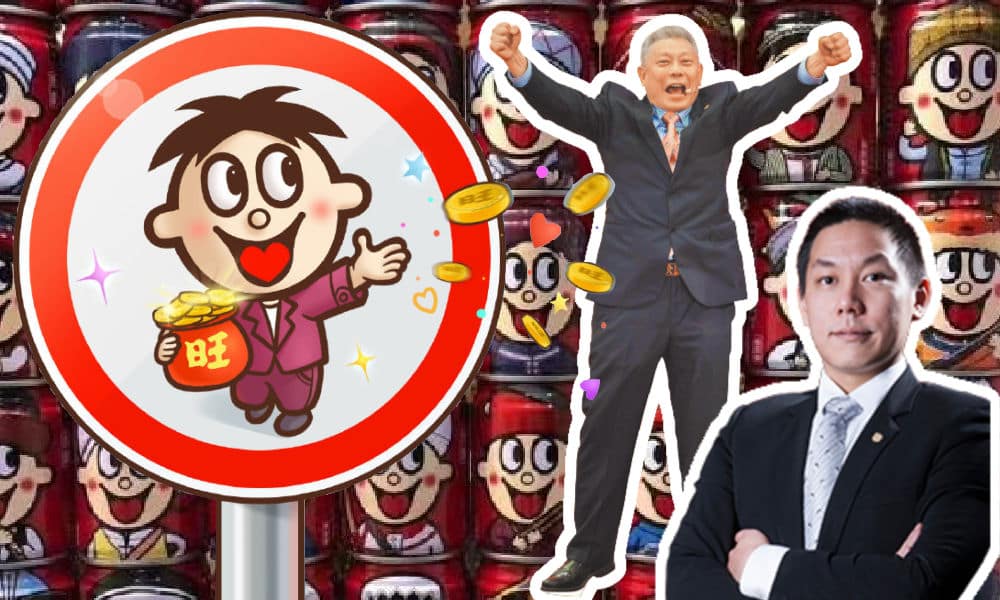
Want Want – you probably know their rice crackers with the cute kid icon – is celebrating its 60th anniversary this year. How did this decades-old brand become all the rage recently in China? From Pelosi to pickles, there is more to it than nostalgia and its cute ‘Hot Kid’ alone.
Wang Wang (旺旺), better known as ‘Want Want’ in English, has become all the rage in China in recent months. In its September issue, the Chinese magazine China Marketing (销售与市场) listed Want Want as the number one brand on its marketing noticeboard hot brand list, referring to it as “‘Lonely Warrior’ Want Want” (‘孤勇者’旺旺).
The Want Want Group (旺旺集团) is the most well-known rice cracker maker in China and one of the largest food and beverage makers in the region.
Want Want is a brand that many Chinese millennials grew up with. The Taiwanese company behind Want Want has a history that dates back to 1962. After becoming the dominant rice cracker maker in Taiwan with a market share as high as 95%, founder Tsai Eng-meng (蔡衍明) looked across the Strait and officially ventured into the mainland market in 1992.
Why is the Want Want brand still so popular in mainland China today? The brand’s success directly goes back to Tsai Eng-meng, who undeniably is a marketing genius with a peculiar style. The Want Want company icon, officially named Wang Zai (旺仔) in Chinese and ‘Hot Kid’ in English, was created in 1979 and depicts a kid with wide open arms and legs, rolling his eyes (fun fact: Hot Kid never looks straight at you).

Want Want Group CEO Tsai with the Want Want icon ‘Hot Kid.’ Image via https://turnnewsapp.com/wd/74725.html.
With its catchy name and distinctive icon, Want Want soon became a household brand in China. Adding to the brand’s popularity are the many commercials throughout the years that show the brand’s style, standing out due to their simplicity and fun energy.
Some of these advertising campaigns have become part of the collective popular memory of Chinese millennials. On the Chinese video site Bilibili, old Want Want commercials bring up nostaligc feelings and still receive millions of views today (see this famous one, or see a collection of classic Want Want commercials on Bilibili here).
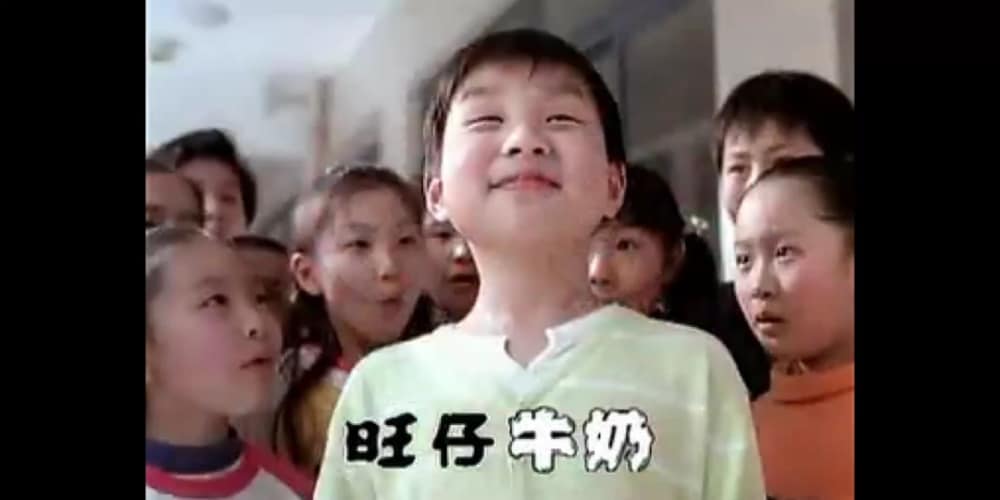
From one of Want Want’s iconic commercials.
Ingenious strategies brought great success to the company from the start and subsequently ushered in “the golden decade” for Want Want from 2004 to 2013, making Tsai the richest man in Taiwan for three consecutive years.
Apart from Want Want’s signature rice cracker products, products such as Hot Kid Milk (旺仔牛奶), Lonely God Potato Chips (浪味仙), and QQ Gummies (旺仔QQ糖) also became household names in the mainland.
However, facing more competition and failing to keep up with Chinese customers’ evolving consumption habits and preferences, Want Want was stuck in a bottleneck period and its sales slowed down after 2014. Its recent comeback and sudden social media success have everything to do with Nancy Pelosi’s controversial Taiwan visit in August of 2021.
A ‘GOOD’ TAIWANESE COMPANY
On July 28, Tsai Wang-Chia (蔡旺家), Tsai Eng-meng’s second son and Want Want’s Chief Operating Officer and executive director, posted three single words on his Weibo account (@Matt旺家): “YOU GO AWAY.”

The text was accompanied by a photo of an old witch, which just so happens to be the nickname Chinese netizens gave to Pelosi, and the timing of the post was right when reports about the U.S. House Speaker’s potential Taiwan visit were coming out. Want Want soon became a hot topic afterward.
People had already been paying more attention to Tsai Wang-chia’s Weibo account in light of the then-ongoing calls to boycott Taiwanese companies on Chinese social media following rumors regarding Pelosi’s controversial visit.
Someone claiming to be an employee at Want Want then posted on the popular Red (Xiaohongshu) app, defending Want Want for being a “good Taiwanese company,” asking people to “please don’t hurt us by mistake.” This triggered a public campaign of digging into Tsai’s previous posts, and netizens soon discovered that the Want Want executive director had published similar posts before.
In March of 2022, when a U.S. delegation visited Taiwan, Tsai bluntly posted: “The American pigs have arrived in Taiwan” (“美国猪到台湾了“).
Because of his consistent patriotic and pro-unification stance, coupled with a down-to-earth personality and plain-spoken style despite being an heir of a multibillion dollar family, Tsai Wang-chia soon won the hearts of millions of Chinese netizens.

Tsai Wang-Chia (蔡旺家) and ‘Hot Kid’ (旺仔)
The hype got so so big that people started claiming that the figure of Want Want, the iconic Hot Kid, was actually based on Tsai Wang-chia as a child – despite the fact that ‘Hot Kid’ was created in 1979 while Tsai Wang-Chia was born in 1984.
PATRIOTIC ‘PRESIDENT WANT’
Tsai’s pro-unification sentiments seem to run in the family. Want Want founder Tsai Eng-meng, who is also commonly referred to as ‘President Want’ (旺董), has long been a unification supporter. This is also reflected in his business empire, which includes the Want Want China Times Group (旺旺中时媒体集团) that owns dominant pan-Blue (pro-China) media outlets in Taiwan.
Various videos, which soon widely circulated online, also showed ‘President Want’ expressing gratitude for the “great market of the mainland” (“因为有大陆这个伟大的市场,才造就了我旺旺的今天”) and proudly declaring that all Want Want employees are “impressive and dignified Chinese people” (堂堂正正的中国人).
To the delight of many Chinese netizens, more events and incidents showing Want Want’s patriotic stance were brought to light one after another.
The company filed for IPO on the HK Stock Exchange in 2008 with the name “Want Want China Holdings Limited” (中国旺旺控股有限公司); its Want Want Hospital in Hunan (湖南旺旺医院) was among the first private institutions to send a medical aid team to Wuhan during the initial COVID outbreak in the city; in 2019, when a Taiwanese celebrity mockingly said on a local program that “mainlanders cannot afford to eat pickles”, its newspaper Want Daily (旺报) published a conspicuous headline on its August 18 frontpage saying “MAINLANDERS CAN AFFORD TO EAT PICKLES!” (“大陆人吃得起榨菜!”), noting on the side: “Taiwanese are Chinese. We are from the same country and therefore should support each other.” (“台湾人就是中国人. 我们都是同一国的,所以当然要相挺.”)
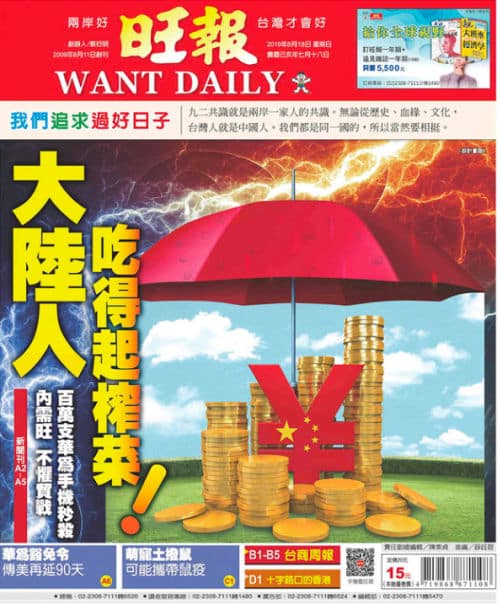
In early August of this year, Want Want soared to the top of Weibo’s trending list, and netizens swarmed its live stream channel on Taobao, vowing to “consume wildly” (“野性消费”) and “empty their stock” (“清空库存”) in support of the brand.
According to the Time Weekly (时代周报), a government-owned newspaper from Guangzhou, the number of viewers on the channel that day reached almost 100,000 – up to ten times more than what the channel usually received in viewers, – and sales of its online shop spiked as many new customers came in after following the trending hashtag.
THE OTHER SIDE OF THE COIN
In contrast to Want Want’s fervent popularity in mainland China, the brand has become more controversial on the other side of the Taiwan Strait, especially in light of its ownership of multiple leading media outlets, with many expressing worries that its dominant position might impact press freedom.
In June of 2019, a predominantly young mass rallied against so-called “red media” (Taiwanese media in favor of Beijing), with Want Want-owned newspapers (China Times 中国时报 and Want Daily 旺报) and TV channels (China Television 中国电视公司 and CTiTV 中天电视台) being among the main targets.

Protesting against Want Want and other ‘pro-China’ companies in Taiwan, image via https://news.ltn.com.tw/news/life/breakingnews/2859708
The following month, the Financial Times published an article, quoting anonymous journalists working for these outlets, saying that their editorial managers took direct instructions from Beijing’s Taiwan Affairs Office, a claim that the Want Want China Times Group later responded to as “malicious slander.”
In late 2020, the Tsai Ing-wen administration stripped CTiTV of its broadcast license upon renewal out of concerns about editorial interference by President Want Tsai Eng-meng. Such a ruling was a first since the founding of Taiwan’s National Communications Commission in 2006, a government body that regulates the industry, and evoked opposition from the ‘Blue Camp’ and controversy among the public.
SUCCESSFUL ON ALL FRONTS
Despite receiving criticism in Taiwan, Want Want has continued its success in mainland China. This year, Want Want is celebrating the company’s 60th anniversary, as well as the 30th year anniversary of the opening of its first factory in mainland China.
China Marketing wrote about Want Want’s 2022 success that “consistency is key” in marketing. Not only did the brand stick with its original logo and traditional products such as rice crackers and its dairy drink, it has also focused on nostalgic or playful ad campaigns throughout the years (think of its successful slogan “You Want, I Want, Everyone Wants” “你旺、我旺、大家旺.”)
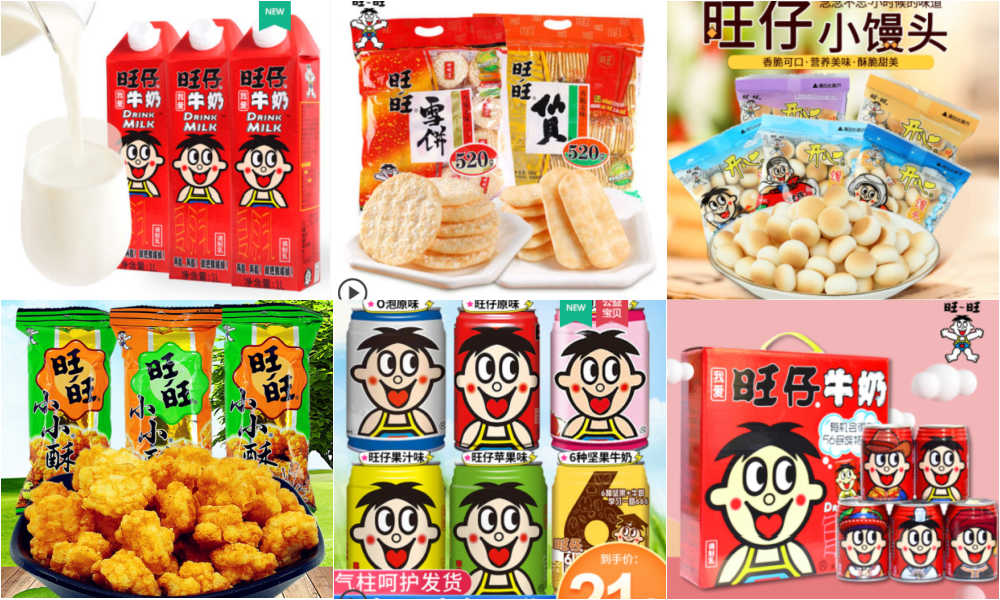
Want Want products for sale on Taobao.
At the same time, the company is not afraid to launch new products and stay active in the world of Chinese social media and e-commerce.
But what has really become an essential point in its regained success this year is the brand’s consistency in delivering a patriotic message through multiple channels that resonated with Chinese consumers at a time of deteriorating US-China relations and more focus on cross-strait relations.
Erke, the Chinese sportswear brand by Hongxing Erke Group (鸿星尔克), was also brought back into the limelight in 2021 after they donated 50 million yuan ($7.7 million) to the Henan flood efforts. When people found out that the relatively low-profile brand donated such a high amount of money to help the people in Henan despite its own losses, its online sales went through the roof – everyone wanted to support this generous ‘patriotic brand.’
While nationalistic consumer sentiments matter, being a ‘patriotic brand’ alone is not enough; it eventually is the combination of being consistent and authentic, delivering popular products, and having a strong marketing campaign. When it comes to the mainland market, Want Want tackled all fronts this year.
In October of 2022, Want Want celebrated China’s National Day by using drones to project netizens’ hopes and wishes for the future all over the Great Wall, including a projection of a giant Want Want drink (#旺旺把爱国刻进了DNA#).
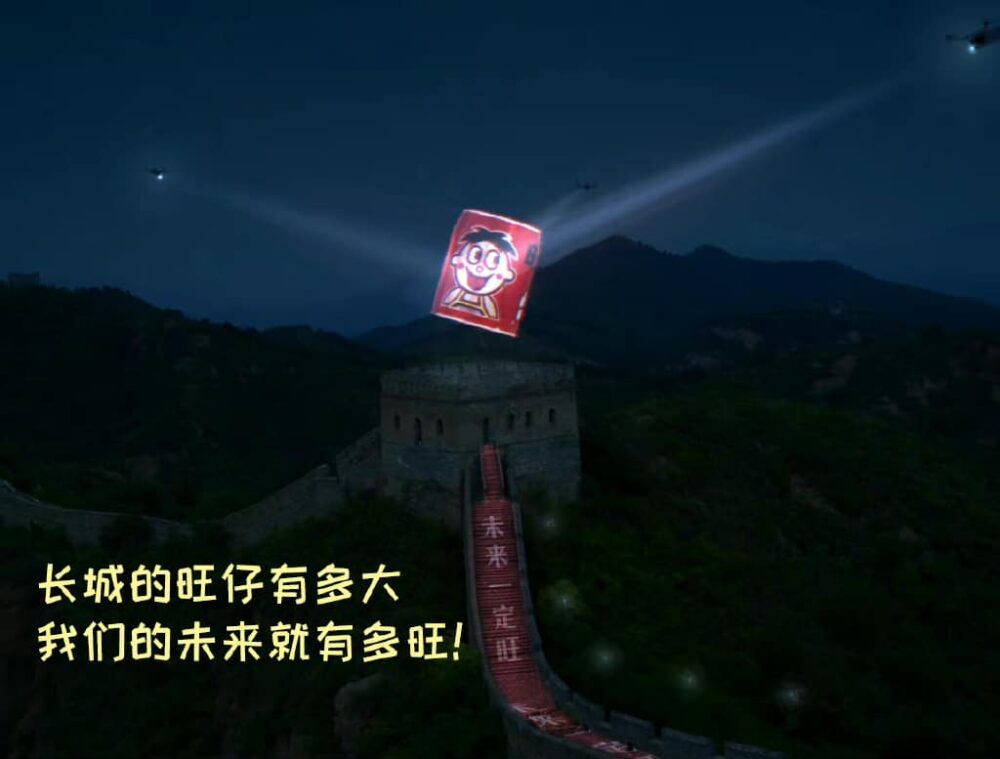
For now, Want Want has practically made ‘loving China’ a part of its brand. Mixing rice crackers with some nationalism is turning out to be a recipe for success – at least in the mainland.
By Tucker Jiang, with contributions by Manya Koetse
Get the story behind the hashtag. Subscribe to What’s on Weibo here to receive our weekly newsletter and get access to our latest articles:
Spotted a mistake or want to add something? Please let us know in comments below or email us. First-time commenters, please be patient – we will have to manually approve your comment before it appears.
©2022 Whatsonweibo. All rights reserved. Do not reproduce our content without permission – you can contact us at info@whatsonweibo.com.
China Brands, Marketing & Consumers
Signals: Hasan Piker’s China Trip & the Unexpected Journey of a Chinese School Uniform to Angola
Hasan Piker’s controversial China tour, a Chinese school uniform resurfaces in Africa, a new winter hotspot, why Chinese elites ‘run’ to Tokyo, and more.
Published
1 day agoon
November 21, 2025
🌊 Signals — Week 47 (2025)
Part of Eye on Digital China, Signals highlights slower trends and online currents behind the daily scroll. This edition was sent to paid subscribers — subscribe to receive the next issue in your inbox.
Welcome to another edition of Eye on Digital China. Different from the China Trend Watch (check the latest one here if you missed it), this edition, part of the new Signals series, is about the slower side of China’s social media: the recurring themes and underlying shifts that signal broader trends beyond the quick daily headlines. Together with the deeper dives, the three combined aim to give you clear updates and a fuller overview of what’s happening in China’s online conversations & digital spaces.
For the coming two weeks, I’ll be traveling from Beijing to Chongqing and beyond (more on that soon) so please bear with me if my posting frequency dips a little. I’ll be sure to pick it up again soon and will do my best to keep you updated along the way. In the meantime, if you know of a must-try hotpot in Chongqing, please do let me know.
In this newsletter: Hasan Piker’s controversial China tour, a Chinese school uniform in Angola, a new winter hotspot, discussions on what happens to your Wechat after you die, why Chinese elites rùn to Tokyo, and more. Let’s dive in.
- 💰 The richest woman in China, according to the latest list by Hurun Research Institute, is the “queen of pharmaceuticals” Zhong Huijuan (钟慧娟) who has accumulated 141 billion yuan (over 19 billion USD). Women account for over 22% of Chinese billionaires (those with more than 5 billion RMB), underscoring China’s globally leading position in producing wealthy female entrepreneurs.
- 🧩 What happens to your WeChat after you die? A user who registered for NetEase Music with a newly reassigned phone number unexpectedly gained access to the late singer Coco Lee’s (李玟) account, as the number had originally belonged to her. The incident has reignited debate over how digital accounts should be handled after death, prompting platforms like NetEase and Tencent to reconsider policies on long-inactive accounts and take stronger measures to protect them.
- 📱 Although millions of viewers swoon over micro-dramas with fantasy storylines where rich, powerful men win over the “girl next door” through money and status, Chinese regulators are now stepping in to curb exaggerated plots featuring the so-called “dominant CEO” (霸道总裁) archetype, signaling stricter oversight for the booming short drama market.
- ☕ A popular Beijing coffee chain calling itself “People’s Cafe” (人民咖啡馆), with its style and logo evoking nationalist visual nostalgia, has changed its name after facing criticism for building its brand – including pricey coffee and merchandise – on Mao era and state-media political connotations. The cafe is now ‘Yachao People’s Cafe’ (要潮人民咖啡馆).
- 👀 Parents were recently shocked to see erotic ads appear on the Chinese nursery rhymes and children’s learning app BabyBus (宝宝巴士), which is meant for kids ages 0–8. BabyBus has since apologized, but the incident has sparked discussions about how to keep children safe from such content.
- 🧧The 2026 holiday schedule has continued to be a big topic of conversation as it includes a 9-day long Spring Festival break (from February 15 to February 23), making it the longest Lunar New Year holiday on record. The move not only gives people more time for family reunions, but also gives a huge boost to the domestic travel industry.
Hasan Piker’s Chinese Tour & The US–China Content Honeymoon

Livestreamer Hasan Piker during his visit to Tiananmen Square flag-rising ceremony.
It’s not time for the end-of-year overviews just yet – but I’ll already say that 2025 was the US–China ‘honeymoon’ year for content creation. It’s when China became “cool,” appealing, and eye-grabbing for young Western social media users, particularly Americans. The recent China trip of the prominent American online streamer Hasan Piker fits into that context.
This left-wing political commentator also known as ‘HasanAbi’ (3 million followers on Twitch, recently profiled by the New York Times) arrived in China for a two-week trip on November 11.

Piker screenshot from the interview with CGTN, published on CGTN.
His visit has been controversial on English-language social media, especially because Piker, known for his criticism of America (which he calls imperialist), has been overly praising China: calling himself “full Chinese,” waving the Chinese flag, joining state media outlet CGTN for an interview on China and the US, and gloating over a first-edition copy of Quotations from Chairman Mao (the Little Red Book). He portrays China as heavily misrepresented in the West and as a country the United States should learn from.

Hasan Piker did an interview with CGTN, posing with Li Jingjing 李菁菁.
During his livestreaming tour, Hasan, who is nicknamed “lemonbro” (柠檬哥) by Chinese netizens, also joined Chinese platforms Bilibili and Xiaohongshu.
But despite all the talk about Piker in the American online media sphere, online conversations, clicks, and views within China are underwhelming. As of now, he has around 24,000 followers on Bilibili, and he’s barely a topic of conversation on mainstream feeds.
Piker’s visit stands in stark contrast to that of American YouTuber IShowSpeed (Darren Watkins), who toured China in March. With lengthy livestreams from Beijing to Chongqing, his popularity exploded in China, where he came to be seen by many as a representative of cultural diplomacy.

IShowspeed in China, March 2025.
IShowSpeed’s success followed another peak moment in online US–China cultural exchange. In January 2025, waves of foreign TikTok users and popular creators migrated to the Chinese lifestyle app Xiaohongshu amid the looming TikTok ban.
Initially, the mass migration of American users to Xiaohongshu was a symbolic protest against Trump and US policies. In a playful act of political defiance, they downloaded Xiaohongshu to show they weren’t scared of government warnings about Chinese data collection. (For clarity: while TikTok is a made-in-China app, it is not accessible inside mainland China, where Douyin is the domestic version run by the same parent company).
The influx of foreigners — who were quickly nicknamed “TikTok refugees” — soon turned into a moment of cultural celebration. As American creators introduced themselves, Chinese users welcomed them warmly, eager to practice English and teach newcomers how to navigate the app. Discussions about language, culture, and societal differences flourished. Before long, “TikTok refugees” and “Xiaohongshu natives” were collaborating on homework assignments, swapping recipes, and bonding through humor. It was a rare moment of social media doing what we hope it can do: connect people, build bridges, and replace prejudice with curiosity.
Some of that same enthusiasm was also visible during IShowSpeed’s China tour. Despite the tour inevitably getting entangled with political and commercial interests, much of it was simply about an American boy swept up in the high energy of China’s vibrant cities and everything they offer.
Different from IShowSpeed, who is known for his meme-worthy online presence, Piker is primarily known for his radical political views. His China enthusiasm feels driven less by cultural curiosity and more by his critique of America.
Because of his stances — such as describing the US as a police state — it’s easy for Western critics to accuse him of hypocrisy in praising China, especially after a brief run-in with security police while livestreaming at Tiananmen Square.
Seen in broader context, Piker’s China trip reflects a shift in how China is used in American online discourse.
Before, it was Chinese ‘public intellectuals’ (公知) who praised the US as a ‘lighthouse country’ (灯塔国), a beacon of democracy, to indirectly critique China and promote a Western modernization model. Later, Chinese online influencers showcased their lives abroad to emphasize how much ‘brighter the moon’ was outside China.
In the post-Covid years, the current reversed: Western content creators, from TikTok influencers to political commentators, increasingly use China to make arguments that are fundamentally about America.
Between these cycles, authentic cultural curiosity gets pushed to the sidelines. The TikTok-refugee moment in early January may have been the closest we’ve come in years: a brief window where Chinese and American users met each other with curiosity, camaraderie, and creativity.
Hasan’s tour, in contrast, reflects a newer phase, one where China is increasingly used as a stage for Western political identity rather than a complex and diverse country to understand on its own terms. I think the honeymoon phase is over.
“Liu Sihan, Your School Uniform Ended Up in Angola”: China’s Second-Hand Clothing in Africa

A Chinese school uniform went viral after a Chinese social media user spotted it in Angola.
“Liu Sihan, your schooluniform is hot in Africa” (刘思涵你的校服在非洲火了) is a sentence that unexpectedly trended after a Chinese blogger named Xiao Le (小乐) shared a video of a schoolkid in Angola wearing a Chinese second-hand uniform from Qingdao Xushuilu Primary School, that had the nametag Liu Sihan on it.
The topic sparked discussions about what actually happens to clothing after it’s donated, and many people were surprised to learn how widely Chinese discarded clothing circulates in parts of Africa.
Liu Sihan’s mother, whose daughter is now a 9th grader in Qingdao, had previously donated the uniform to a community clothing donation box (社区旧衣回收箱) after Liu outgrew it. She intended it to help someone in need, never imagining it to travel all the way to Africa.
In light of this story, one netizen shared a video showing a local African market selling all kinds of Chinese school items, including backpacks, and people wearing clothing once belonging to workers for Chinese delivery platforms. “In Africa, you can see school uniforms from all parts of China, and even Meituan and Eleme outfits,” one blogger wrote.
When it comes to second-hand clothing trade, we know much more about Europe–Africa and US–Africa flows than about Chinese exports, and it seems there haven’t been many studies on this specific topic yet. Still, alongside China’s rapid economic transformations, the rise of fast fashion, and the fact that China is the world’s largest producer and consumer of textiles, the country now has an enormous abundance of second-hand clothing.
According to a 2023 study by Wu et al. (link), China still has a long way to go in sustainable clothing disposal. Around 40% of Chinese consumers either keep unwanted clothes at home or throw them away.
But there may be a shift underway. Donation options are expanding quickly, from government bins to brand programs, and from second-hand stores to online platforms that offer at-home pickup.

Chinese social media users posting images of school/work uniforms from China worn by Africans.
As awareness grows around the benefits of donating clothing (reducing waste, supporting sustainability, and the emotional satisfaction of giving), donation rates may rise significantly. The story of Liu Sihan’s uniform, which many found amusing, might even encourage more people to donate. And if that happens, scenes of African children (and adults) wearing Chinese-donated clothes may become much more common than they now are.
Laojunshan: New Hotspot in Cold Winter

Images from Xiaohongshu, 背包里的星子, 旅行定制师小漾
Go to Zibo for BBQ, go to Tianshui for malatang, go to Harbin for the Ice Festival, cycle to Kaifeng for soup dumplings, or head to Dunhuang to ride a camel — over recent years, a number of Chinese domestic destinations have turned into viral hotspots, boosted by online marketing initiatives and Xiaohongshu influencers.
This year, Laojunshan is among the places climbing the trending lists as a must-visit spot for its spectacular snow-covered landscapes that remind many of classical Chinese paintings. Laojunshan (老君山), a scenic mountain in Henan Province, is attracting more domestic tourists for winter excursions.
Xiaohongshu is filled with travel tips: how to get there from Luoyang station (by bus), and the best times of day to catch the snow in perfect light (7–9 AM or around 6–6:30 PM).
With Laojunshan, we see a familiar pattern: local tourism bureaus, state media, and influencers collectively driving new waves of visitors to the area, bringing crucial revenue to local industries during what would otherwise be slower winter months.
WeChat New Features & Hong Kong Police on Douyin
🟦 WeChat has been gradually rolling out a new feature that allows users to recall a batch of messages all at once, which saves you the frantic effort of deleting each message individually after realizing you sent them to the wrong group (or just regret a late-night rant). Many users are welcoming the update, along with another feature that lets you delete a contact without wiping the entire chat history. This is useful for anyone who wants to preserve evidence of what happened before cutting ties.

🟦The Hong Kong Police Force recently celebrated its two-year anniversary on Douyin (the Chinese version of TikTok), having accumulated nearly 5 million followers during that time. To mark the occasion, they invited actor Simon Yam to record a commemorative video for their channel (@香港警察). The presence of the Hong Kong Police on the Chinese app — and the approachable, meme-friendly way they’ve chosen to engage with younger mainland audiences — is yet another signal of Hong Kong institutions’ strategic alignment with mainland China’s digital infrastructure, a shift that has been gradually taking place. The anniversary video proved popular on Douyin, attracting thousands of likes and comments.
Why Chinese Elite Rùn to Japan (by ChinaTalk)
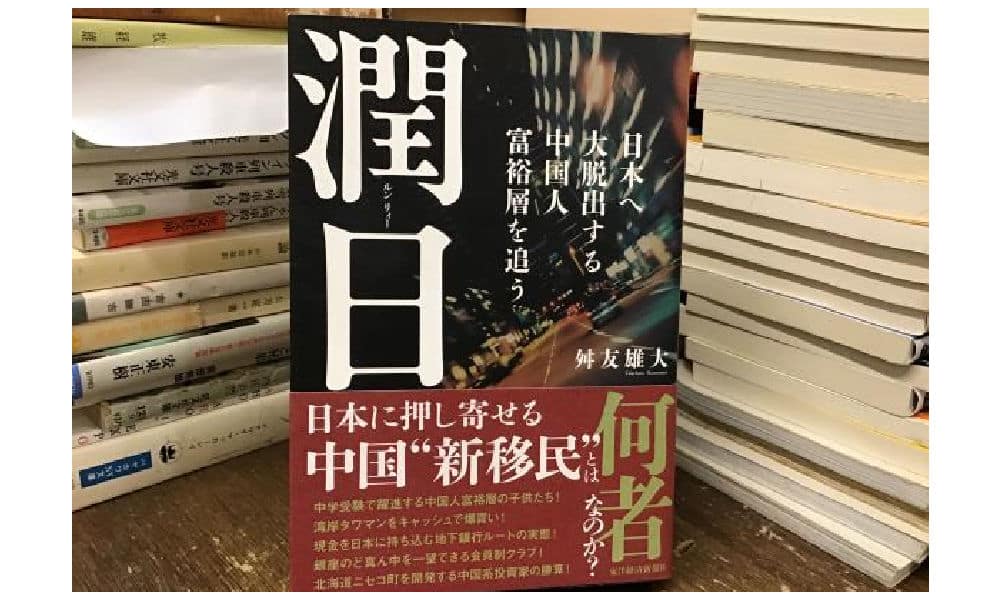
Over the past week, Japan has been trending every single day on Chinese social media in light of escalating bilateral tensions after Japanese PM Takaichi made remarks about Taiwan that China views as a direct military threat. The diplomatic freeze is triggering all kinds of trends, from rising anti-Japanese sentiment online and a ban on Japanese seafood imports to Chinese authorities warning citizens not to travel to Japan.
You’d think Chinese people would want to be anywhere but Japan right now — but the reality is far more nuanced.
In a recent feature in ChinaTalk, Jordan Schneider interviewed Japanese journalist & researcher Takehiro Masutomo (舛友雄大) who has just published a book about Japan’s new Chinese diaspora, explaining what draws Chinese dissidents, intellectuals, billionaires, and middle-class families to Tokyo.
The book is titled Run Ri: 潤日 Following the Footsteps of Elite Chinese Escaping to Japan (only available in Japanese and Traditional Chinese for now). (The word Rùn 润/潤, by the way, is Chinese online slang and meme expresses the desire to escape the country.)
A very interesting read on how Chinese communities are settling in Japan, a place they see as freer than Hong Kong and safer than the U.S., and one they’re surprisingly optimistic about — even more so than the Japanese themselves.
Thanks for reading this Eye on Digital China Signals. For fast-moving trends and deeper dives, keep an eye on the upcoming newsletters.
And if you just so happen to be reading this without a subscription and appreciate my work, consider joining to receive future issues straight in your inbox.
A small housekeeping note:
This Eye on Digital China newsletter is co-published for subscribers on both Substack and the main site. If you’re registered on both platforms, you’ll receive duplicate emails — so if that bothers you, please pick your preferred platform and unsubscribe from the other.
Many thanks to Miranda Barnes for helping curate some of the topics in this edition.
— Manya
Spotted an error or want to add something? Comment below or email me.
First-time commenters require manual approval.
©2025 Eye on Digital China / What’s on Weibo. Do not reproduce without permission —
contact info@whatsonweibo.com.
China Brands, Marketing & Consumers
House of Wahaha: Zong Fuli Resigns
In the year following her father’s death, Zong Fuli dealt with controversy after controversy as the head of Chinese food & beverage giant Wahaha.
Published
1 month agoon
October 14, 2025
It’s a bit like a Succession-style corporate drama 🍿.
Over the past few years, we’ve covered stories surrounding Chinese beverage giant Wahaha (娃哈哈) several times — and with good reason.
Since the passing of its much-beloved founder Zong Qinghou (宗庆后) in March 2024, the company has been caught in waves of internal turmoil.
Some context: Wahaha is regarded as a patriotic brand in China — not only because it’s the country’s equivalent of Coca-Cola or PepsiCo (they even launched their own cola in 1998 called “Future Cola” 非常可乐, with the slogan “The future will be better” 未来会更好), but also because its iconic drinks are tied to the childhood memories of millions.
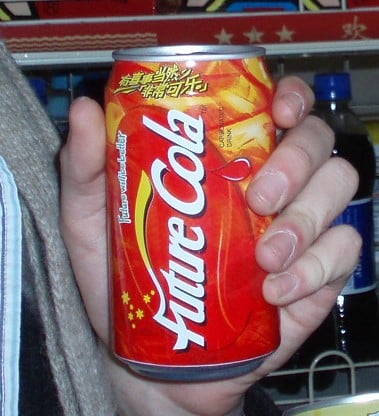
Future Cola by Wahaha via Wikipedia.
There’s also the famous 2006 story when Zong Qinghou refused a buyout offer from Danone. Although the details of that deal are complex, the rejection was widely seen as Zong’s defense of a Chinese brand against foreign takeover, contributing to his status as a national business hero.
After the death of Zong, his daughter Zong Fuli, also known as Kelly Zong (宗馥莉), took over.
🔹 But Zong Fuli soon faced controversy after controversy, including revelations that Wahaha had outsourced production of some bottled water lines to cheaper contractors (link).
🔹 There was also a high-profile family inheritance dispute involving three illegitimate children of Zong Qinghou, now living in the US, who sued Zong Fuli in Hong Kong courts, claiming they were each entitled to multi-million-dollar trust funds and assets.
🔹 More legal trouble arrived when regulators and other shareholders objected to Zong Fuli using the “Wahaha” mark through subsidiaries and for new products outside officially approved channels (the company has 46% state ownership).
⚡️ The trending news of the moment is that Zong Fuli has officially resigned from all positions at Wahaha Group as chairman, legal representative, and director. She reportedly resigned on September 12, after which she started her own brand named “Wa Xiao Zong” (娃小宗). One related hashtag received over 320 million views on Weibo (#宗馥莉已经辞职#). Wahaha’s board confirmed the move on October 10, appointing Xu Simin (许思敏) as the new General Manager. Zong remains Wahaha’s second-largest shareholder.
🔹 To complicate matters further, Zong’s uncle, Zong Wei (宗伟), has now launched a rival brand — Hu Xiao Wa (沪小娃) — with product lines and distribution networks nearly identical to Wahaha’s.
As explained by Weibo blogger Tusiji (兔撕鸡大老爷), under Zong Qinghou, Wahaha relied on a family-run “feudal” system with various family-controlled factories. Zong Fuli allegedly tried to dismantle this system to centralize power, fracturing the Wahaha brand and angering both relatives and state investors.
Others also claim that Zong had already been engaged in a major “De-Wahaha-ization” (去娃哈哈化) campaign long before her resignation.
In August of this year, Zong gave an exclusive interview to Caijing (财经) magazine where she addressed leadership challenges and public controversies. In the interview, Zong spoke more about her views on running Wahaha, advocating long-term strategic growth over short-term results, and sharing her determination to not let controversy distract her from business operations. That plan seems to have failed.
While Chinese netizens are watching this family brand war unfold, many are rooting for Zong after everything she has gone through – they feel her father left her in a complicated mess after his death.
At the same time, others believe she tried to run Wahaha in a modern “Western” way and blame her for that.
For the brand image of Wahaha, the whole ordeal is a huge blow. Many people are now vowing not to buy the brand again.
As for Zong’s new brand, we’ll have to wait for the next episode in this family company drama to see how it unfolds.
By Manya Koetse
(follow on X, LinkedIn, or Instagram)
Spotted a mistake or want to add something? Please let us know in comments below or email us. First-time commenters, please be patient – we will have to manually approve your comment before it appears.
©2025 Whatsonweibo. All rights reserved. Do not reproduce our content without permission – you can contact us at info@whatsonweibo.com.
Subscribe
Eye on Digital China is a reader-supported publication by
Manya Koetse (@manyapan) and powered by What’s on Weibo.
It offers independent analysis of China’s online culture, media, and social trends.
To receive the newsletter and support this work, consider
becoming a paid subscriber.

Get in touch
Have a tip, story lead, or book recommendation? Interested in contributing? For ideas, suggestions, or just a quick hello, reach out here.

Signals: Hasan Piker’s China Trip & the Unexpected Journey of a Chinese School Uniform to Angola

About Eye on Digital China — Powered by What’s on Weibo

China Trend Watch: Japan Tensions, Nexperia Fallout, Yunnan’s ‘Wild Child,’ & “Modern Opium”

Eye on Digital China: How Chinese Social Media Evolved from the Blog Era to the AI-driven Age

Trump and Takaichi: The Unexpected Love Affair

The Wong Kar-wai Scandal Explained: The Dark Side of ‘Blossoms Shanghai’

From Schadenfreude to Sympathy: Chinese Online Reactions to Charlie Kirk Shooting

From Nobel Farewell to ‘VIP Toilets’: What’s Trending in China

From Tents to ‘Tangping Travel”: New Travel Trends among Young Chinese

China’s “Post Parade Afterglow”: 6 Social Media Trends
Popular Reads
-

 China Memes & Viral4 months ago
China Memes & Viral4 months agoHidden Cameras and Taboo Topics: The Many Layers of the “Nanjing Sister Hong” Scandal
-

 China Insight7 months ago
China Insight7 months agoUnderstanding the Dr. Xiao Medical Scandal
-

 China Memes & Viral11 months ago
China Memes & Viral11 months agoOur Picks: Top 10 Chinese Buzzwords and Phrases of 2024 Explained
-

 China Digital10 months ago
China Digital10 months ago“Dear Li Hua”: The TikTok/Xiaohongshu Honeymoon Explained





mmmm_crackers
November 1, 2022 at 11:06 pm
insightful. i am an old man born and raised in the you.ess.ayy but i have fond memories of want want. i appreciate teh article. (y)